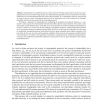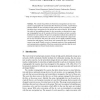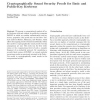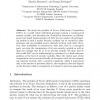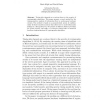114
Voted
ESORICS
2006
Springer
15 years 6 months ago
2006
Springer
Abstract. This paper presents an access control model for programming applications in which the access control to resources can employ user interaction to obtain the necessary perm...
138
Voted
ESORICS
2006
Springer
15 years 6 months ago
2006
Springer
IDS research still needs to strengthen mathematical foundations and theoretic guidelines. In this paper, we build a formal framework, based on information theory, for analyzing and...
120
click to vote
ESORICS
2006
Springer
15 years 6 months ago
2006
Springer
We propose a logic for specifying security policies at a very el of abstraction. The logic accommodates the subjective nature of affirmations for authorization and knowledge withou...
111
Voted
ESORICS
2006
Springer
15 years 6 months ago
2006
Springer
Abstract. Simulatability has established itself as a salient notion for defining and proving the security of cryptographic protocols since it entails strong security and compositio...
116
Voted
ESORICS
2006
Springer
15 years 6 months ago
2006
Springer
Abstract. We consider the problem of efficient key management and user revocation in cryptographic file systems that allow shared access to files. A performanceefficient solution t...
116
Voted
ESORICS
2006
Springer
15 years 6 months ago
2006
Springer
Abstract We present a computational analysis of basic Kerberos with and without its public-key extension PKINIT in which we consider authentication and key secrecy properties. Our ...
104
Voted
ESORICS
2006
Springer
15 years 6 months ago
2006
Springer
We study the problem of Secure Multi-party Computation (SMC) in a model where individual processes contain a tamper-proof security module, and introduce the TrustedPals framework, ...
106
Voted
ESORICS
2006
Springer
15 years 6 months ago
2006
Springer
Motivated by the need of application-level access control in dynamically extensible systems, this work proposes a static annotation system for modeling capabilies in a Java-like pr...
126
Voted
ESORICS
2006
Springer
15 years 6 months ago
2006
Springer
Timing side channels are a serious threat to the security of cryptographic algorithms. This paper presents a novel method for the timing-sensitive analysis of information flow in s...
102
Voted
CSFW
2006
IEEE
15 years 6 months ago
2006
IEEE

